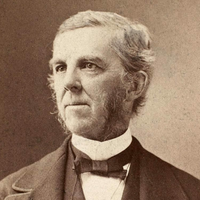Even
IT may be, yes, it must be, Time that brings
An end to mortal things,
That sends the beggar Winter in the train
Of Autumn’s burdened wain,—
Time, that is heir of all our earthly state,
And knoweth well to wait
Till sea hath turned to shore and shore to sea,
If so it need must be,
Ere he make good his claim and call his own
Old empires overthrown,—
Time, who can find no heavenly orb too large
To hold its fee in charge,
Nor any motes that fill its beam so small,
But he shall care for all,—
It may be, must be,—yes, he soon shall tire
This hand that holds the lyre.
Then ye who listened in that earlier day
When to my careless lay
I matched its chords and stole their first-born thrill,
With untaught rudest skill
Vexing a treble from the slender strings
Thin as the locust sings
When the shrill-crying child of summer’s heat
Pipes from its leafy seat,
The dim pavilion of embowering green
Beneath whose shadowy screen
The small sopranist tries his single note
Against the song-bird’s throat,
And all the echoes listen, but in vain;
They hear no answering strain,—
Then ye who listened in that earlier day
Shall sadly turn away,
Saying, 'The fire burns low, the hearth is cold
That warmed our blood of old;
Cover its embers and its half-burnt brands,
And let us stretch our hands
Over a brighter and fresh-kindled flame;
Lo, this is not the same,
The joyous singer of our morning time,
Flushed high with lusty rhyme!
Speak kindly, for he bears a human heart,
But whisper him apart,—
Tell him the woods their autumn robes have shed
And all their birds have fled,
And shouting winds unbuild the naked nests
They warmed with patient breasts;
Tell him the sky is dark, the summer o’er,
And bid him sing no more!'
Ah, welladay! if words so cruel-kind
A listening ear might find!
But who that hears the music in his soul
Of rhythmic waves that roll
Crested with gleams of fire, and as they flow
Stir all the deeps below
Till the great pearls no calm might ever reach
Leap glistening on the beach,—
Who that has known the passion and the pain,
The rush through heart and brain,
The joy so like a pang his hand is pressed
Hard on his throbbing breast,
When thou, whose smile is life and bliss and fame
Hast set his pulse aflame,
Muse of the lyre! can say farewell to thee?
Alas! and must it be?
In many a clime, in many a stately tongue,
The mighty bards have sung;
To these the immemorial thrones belong
And purple robes of song;
Yet the slight minstrel loves the slender tone
His lips may call his own,
And finds the measure of the verse more sweet,
Timed by his pulse’s beat,
Than all the hymnings of the laurelled throng.
Say not I do him wrong,
For Nature spoils her warblers,—them she feeds
In lotus-growing meads
And pours them subtle draughts from haunted streams
That fill their souls with dreams.
Full well I know the gracious mother’s wiles
And dear delusive smiles!
No callow fledgling of her singing brood
But tastes that witching food,
And hearing overhead the eagle’s wing,
And how the thrushes sing,
Vents his exiguous chirp, and from his nest
Flaps forth—we know the rest.
I own the weakness of the tuneful kind,—
Are not all harpers blind?
I sang too early, must I sing too late?
The lengthening shadows wait
The first pale stars of twilight,—yet how sweet
The flattering whisper’s cheat,—
‘Thou hast the fire no evening chill can tame,
Whose coals outlast its flame!’
Farewell, ye carols of the laughing morn,
Of earliest sunshine born!
The sower flings the seed and looks not back
Along his furrowed track;
The reaper leaves the stalks for other hands
To gird with circling bands;
The wind, earth’s careless servant, truant-born,
Blows clean the beaten corn
And quits the thresher’s floor, and goes his way
To sport with ocean’s spray;
The headlong-stumbling rivulet scrambling down
To wash the sea-girt town,
Still babbling of the green and billowy waste
Whose salt he longs to taste,
Ere his warm wave its chilling clasp may feel
Has twirled the miller’s wheel.
The song has done its task that makes us bold
With secrets else untold,—
And mine has run its errand; through the dews
I tracked the flying Muse;
The daughter of the morning touched my lips
With roseate finger-tips;
Whether I would or would not, I must sing
With the new choirs of spring;
Now, as I watch the fading autumn day
And trill my softened lay,
I think of all that listened, and of one
For whom a brighter sun
Dawned at high summer’s noon. Ah, comrades dear,
Are not all gathered here?
Our hearts have answered.—Yes! they hear our call:
All gathered here! all! all!

